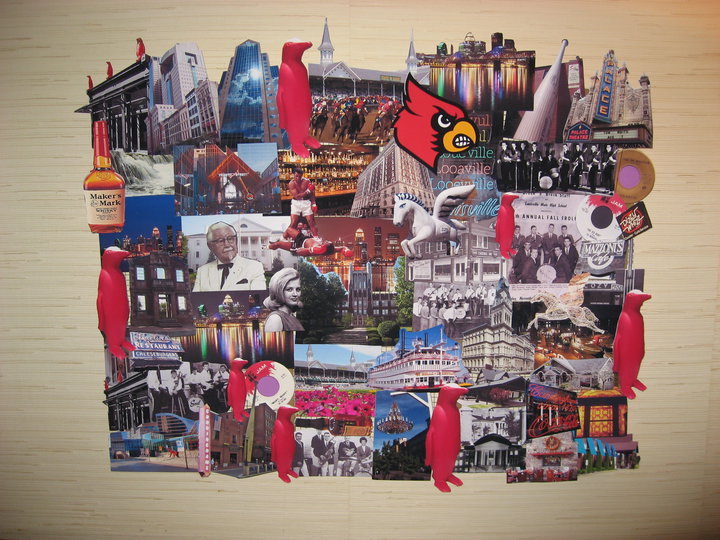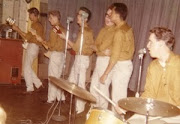Wednesday, May 16, 2012
Local Louisville Musician Remembers Dick Clark
Link Includes Video and article .
http://www.whas11.com/home/Local-musician-recalls-tour-with-Dick-Clark-148030065.html
Thanks to Wayne Mcdonald for sending and Marvin Maxwell for the interview with WHAS .
Dick Clark is credited with introducing Rock-n-Roll to mainstream America. He also formed a traveling tour call the Caravan of Stars.
In the ‘60s, a local group called Soul Inc. got the chance of a lifetime. Marvin Maxwell, owner of Mom’s Music, was the drummer. He said he’ll never forget the phone call he received when he was asked to join the tour while at work.
“He said, ‘Would you like to go on the road with the Dick Clark Caravan of Stars?’ and I like drew a couple of breaths and said, ‘Well sure. When?’ and they said, ‘Tonight,’" Maxwell said.
Maxwell quit his job and the band joined the tour. He said they played 30 shows in 30 states in 30 days. He recalled Dick Clark.
“He was a star as much as anybody else in those days or more so. He was the one who got this Rock-n-Roll thing going, but he was a very nice, clean cat. A very nice dude,” Maxwell said.
Clark died Wednesday from a massive heart attack in Los Angeles. He was 82.
“I don’t know what the words are, but it's almost a shock that he’s gone because he got so much going for the music industry,” Maxwell said.
Clark is survived by his wife and three children.
Blogger Comments :
Growing up in Louisville , one did not get to see Dick Clark unless your TV had UHF . That's right , Mr Clark was on WLKY Channel 32 .
The first commercial UHF TV station in the US, Portland Oregon's KPTV, received its license and went on the air in late 1952. The FCC had authorized the new TV channels 14 through 83 earlier that year, to relieve the crowding that was occurring as commercial television boomed in the post-war period. To receive the new channels, if any were assigned in your area, you would need a converter for your existing TV set (which of course tuned only 2 through 13). Though the TV set manufacturers were pretty quick to make built-in UHF tuners an (extra-cost) option for their sets, it wasn't until 1964 that the FCC required UHF capability in all new TVs, and 1975 before they had to be as easy to use as the VHF tuners. Add-on converter boxes were therefore the common way to get the additional channels for many years.
So , another memory from the past .
Saturday, May 12, 2012
Garage Bands In Louisville in the early 60's from Mike Gossett
Our thanks to Mike Gossett for this portrait of Louisville Rock and Roll . We hope there is much more to come . If any of you all have memories you would like to share , please comment .
Please see Mike's earlier post ( A planted seed ) on the Louisville Music blog and learn how the Bitter Seeds were named .
“Garage Bands”
Circa 1960
You
know, my temperature's risin'
The jukebox's blowin' a fuse.
My heart's beatin' rhythm
And my soul keeps a-singin' the blues.
Roll Over Beethoven and tell Tschaikovsky the news.
The jukebox's blowin' a fuse.
My heart's beatin' rhythm
And my soul keeps a-singin' the blues.
Roll Over Beethoven and tell Tschaikovsky the news.
-
Chuck Berry’s “Roll Over Beethoven, 1956.
In the spring of 1956,
at the critically impressionable age of 11, when my friends and I
were just graduating from elementary school, Chuck Berry in musical
verse famously suggested that Beethoven should roll over and
tell Tschaikovsky the news. The news was aplenty, not the
least of which that there was a musical revolution coming that would
make all other music from the present to the ancient past seem but a
footnote.
Chuck Berry, Little
Richard, Bo Diddley, and Ray Charles were some of the “prime
movers” of the musical revolution underway. The new music was
simply fused elements of black gospel, deep south rhythm and blues
and hard core country music. The official arrival and identification
of the new music as rock and roll would come via a good
looking white kid from Tennessee by the name of Elvis Presley.
An international
spending spree ensued on electric guitars, drums, and saxophones by
rock music enthralled teens. Mel Bay “How to Play the Guitar”
books flew off the shelves. Hours and hours of listening to the
latest hit records, and mind-numbing practice sessions in an attempt
to clone the exact sound of the revered rock and roll icons took up
every free moment of wannabe rock and rollers. The same zeal would
apply for a cappela, street corner harmonizing dubbed Doo Wop.
Rehearsal halls for this new music was typically the suburban
neighborhood garage (or basement) thus the term “garage band”
would later became part of modern American lexicon.
By autumn 1959 when
these very young fresh music zealots headed off to high schools some
of best rock and roll and Doo Wop talent in the nation had bloomed in
our home town. The Carnations and Tren-Dells, The Sultans, Cosmo and
the Counts, The Monarchs, The Epics, and The Bitter Seeds were
playing music at high school sorority dances, teen clubs, proms, and
yes even seedy night clubs in and out of Louisville. These teen bands
played clubs in the infamous Lebanon, KY., e.g. The Golden Horseshoe,
Club Cherry and Club 68, clubs that hosted national talents like Ike
and Tina Turner, Bo Diddley, B.B. King, Fats Domino, Otis Redding,
and many more. And the aforementioned Louisville teenage bands graced
these same stages, most not even old enough to drive. A father of one
of the musician’s in our band, The Bitter Seeds, would rent a
school bus and driver to get our band to our club performances in
Lebanon.
( Blogger Note : Please see earlier posts for pictures of the clubs in Lebanon, KY , USA )
One of the most well
known and looked up to teen rock and roll artist of that time was
Wayne Young (Manual 1961), the teen guitarist all other
Louisville teenage rock and roll guitarist aspired to be. His love of
the new music, and natural talent produced a hard drivin’ rock and
roll, rhythm and blues style of guitar playing (think Eric Clapton)
that elevated him to professional musicianship that far transcended
his young age. After his years at Manual, Wayne would go on to play
with many other well known rock bands, cut records, and even did two
tours with Dick Clark’s Caravan of Stars and Wayne is
still going strong today in the Louisville music scene. (Go on line
and Google Wayne Young.)
Another “garage band”
artist of that time was Wayne McDonald (Manual 1962). He
started out playing French horn in the Jr. High School orchestra.
Don’t laugh, if you did not already know it, Bo Diddley was an
accomplished violinist. Wayne started out as lead singer for The
Bitter Seeds. Through a tenacious love of music, seeker of
perfection, and a work ethic that none of us could match, he
transformed himself from a classical French horn player into white
vocalist versions of James Brown and Wilson Pickett. A testament to
reaching authenticity and purity of heart thumpin’ soulful rock was
the observance of the patrons of the all black club in Lebanon known
as Club Cherry were on their feet and loudly showing their approval
of his style, showmanship and music. I know, I was there. After
leaving Manual, Wayne McDonald also worked with other well known rock
bands, cut a few records, and like Wayne Young, traveled with Dick
Clark’s Caravan of Stars. Unlike Mr. Young, Mr. McDonald
has now hung up his rock and roll shoes. Unless there is a local
gathering of the old Louisville rock and roll bands and Wayne is
asked to come up to sing and give us all a moment to nostalgically
relive the way things use to be in the early 1960’s at Manual and
musical events in the south end of Louisville.
Manual
Tau Delta Tau Sorority Dance, South Park Country Club - 1961
The
Bitter Seeds Standing,
left to right: Roger
Pfeiffer, (Manual
1962) trumpet and background singer; George East, lead guitar; Mike
Gossett, (Manual 1962)
rhythm guitar; Jaybird, background singer; Eddie Huettig, background
singer; Tim Hughes, saxophone; Wayne
McDonald, (Manual
1962) lead singer; Eugene Roberts, piano; and seated, Steve
Yeager, (Manual 1962)
drummer.
Subscribe to:
Posts (Atom)











